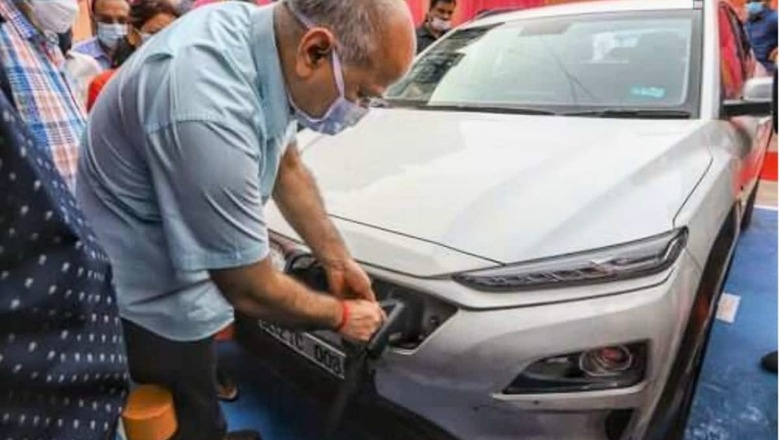
views
Taking forward Delhi’s ‘Switch Delhi’ campaign, Power Minister in AAP-Led Delhi government Satyendar Jain has directed all buildings like malls, shopping complexes, cinema halls/multiplexes, office spaces, hotels, restaurants, hospitals with parking capacity of over 100 vehicles to set aside at least 5 percent of parking capacity for electric vehicles with suitable EV chargers.
The Delhi government recently ordered all its departments to replace all hired fuel vehicles with electric vehicles within the next six months. It has also been informed that the transport department of Delhi will be the nodal body to monitor the progress of the transition from existing diesel/petrol vehicle fleet to electric vehicles. It will also be necessary for all the departments to produce monthly action reports on the transition to EVs by the 5th of every month to the nodal department.
Commenting on the development, Deputy Chief Minister of Delhi, Manish Sisodia, said that over 2,000 petrol and diesel vehicles will replaced with electric vehicles.
“It is the dream of Chief Minister Arvind Kejriwal to make Delhi a pollution-free city. The decision that all government departments will shift to electric vehicles is a historic one. Delhi will be the capital of the world where all government departments switch to electric vehicles for road travel," Sisodia said.
An order in this regard issued by the Special Secretary (Finance), Delhi government, stated, “In pursuance of Clause 4.6.2 of the Delhi Electric Vehicle Policy, 2020, notified by Government of NCT of Delhi dated 7/8/2020 of Transport Department GNCT of Delhi, the competent authority has decided that all departments, autonomous bodies and grantee institution of the government of NCT of Delhi shall shift their existing hired petrol/diesel/CNG vehicles to electric vehicles (EVs) through a lease/hiring model within a timeframe of six months and procure new electric vehicles against condemnable IC Engine Vehicles."
The Delhi EV policy, announced in August last year, envisages that 25 per cent of all new vehicle registrations should be Battery Electric Vehicles (BEVs) by 2024.
The policy gives a subsidy of Rs 10,000 per kWh to the first 1,000 e-cars or electric four-wheelers, with a capping of Rs 150,000 per vehicle. A subsidy of Rs 5,000 per kWh of the battery capacity up to Rs 30,000 is also to be given on the purchase of each electric two-wheeler, auto-rickshaw, rickshaw and freight vehicle. To push people to shift to EVs, the policy also has a “scrapping incentive" for those who make the switch.
Read all the Latest News, Breaking News and Coronavirus News here
















Comments
0 comment